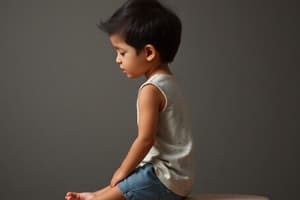Podcast
Questions and Answers
What is lifespan development?
What is lifespan development?
A pattern of change involving both growth and decline, beginning at conception and lasting until death.
Which stage does NOT belong to the lifespan stages?
Which stage does NOT belong to the lifespan stages?
- Middle Adulthood
- Early Childhood
- Late Adulthood
- Young Adulthood (correct)
Development is multidisciplinary.
Development is multidisciplinary.
True (A)
Match the following developmental processes with their focus:
Match the following developmental processes with their focus:
Erik Erikson's theory consists of ______ stages of psychosocial development.
Erik Erikson's theory consists of ______ stages of psychosocial development.
What are the four conceptions of age?
What are the four conceptions of age?
What does Maslow's Hierarchy of Needs outline?
What does Maslow's Hierarchy of Needs outline?
Stability in adulthood indicates that changes do not happen.
Stability in adulthood indicates that changes do not happen.
What does the term 'plastic' refer to in the context of lifespan development?
What does the term 'plastic' refer to in the context of lifespan development?
Which of the following is NOT considered a characteristic of lifespan development?
Which of the following is NOT considered a characteristic of lifespan development?
Which developmental process focuses on changes in relationships and personality?
Which developmental process focuses on changes in relationships and personality?
What is the primary focus of biological processes in lifespan development?
What is the primary focus of biological processes in lifespan development?
Which lifespan stage follows Preschool in the series of lifespan stages?
Which lifespan stage follows Preschool in the series of lifespan stages?
Which concept of age includes the number of years since birth?
Which concept of age includes the number of years since birth?
What is a contemporary concern in lifespan development that relates to health and well-being?
What is a contemporary concern in lifespan development that relates to health and well-being?
Which of the following best describes the term 'contextual' in lifespan development?
Which of the following best describes the term 'contextual' in lifespan development?
Flashcards are hidden until you start studying
Study Notes
Lifespan Development Overview
- Lifespan development encompasses change patterns involving growth and decline.
- It spans from conception to death, subdivided into distinct stages.
Lifespan Stages
- Stages include: Conception to Birth, Early Childhood, Preschool, Middle Childhood, Preteen, Adolescence, Early Adulthood, Middle Adulthood, Late Adulthood, and End of Life.
Interdisciplinary Nature
- Closely connected to neuroscience, cognitive, emotional, and social psychology.
Key Characteristics of Lifespan Development
- Development is Lifelong: No age period dominates; growth can occur at any time.
- Development is Multidirectional: Various dimensions change in different ways — some grow while others decline.
- Development is Plastic: Individuals can change throughout their lifespan.
- Development is Multidisciplinary: Drawn from diverse fields including psychology, sociology, anthropology, and neuroscience.
- Development is Contextual: Influenced by biological, sociocultural, historical, and individual life events.
- Development Involves Growth, Maintenance, and Regulation: These processes contribute throughout life.
Contemporary Concerns in Lifespan Development
- Health and Well-being: Lifestyle choices and substance abuse significantly impact development.
- Parenting: The effects of divorce and child maltreatment on child development.
- Education: Challenges such as bilingual education access and poverty's impact on learning.
Sociocultural Factors
- Socio-economic status, gender, culture, and ethnicity shape developmental experiences and outcomes.
- Social Policy influences welfare and well-being.
Developmental Processes
- Biological Processes: Encompass genetic influences, physical growth, brain maturation, and motor skills.
- Cognitive Processes: Relate to changes in thought, language, and intelligence, with caregiver responsiveness being crucial in early years.
- Socio-emotional Processes: Focus on relational, emotional, and personality changes throughout life.
Conceptions of Age
- Biological Age: Correlates with physical health compared to peers.
- Social Age: Defined by societal roles and expectations.
- Chronological Age: The total years lived since birth.
- Psychological Age: Indicates adaptive capacity relative to others of the same chronological age.
Developmental Issues
- Nature vs. Nurture: Examines the influence of genetics vs. environmental factors in development.
- Continuity vs. Discontinuity: Discusses whether development is gradual or occurs in distinct stages.
- Stability vs. Change: Evaluates whether individuals remain stable or continue to develop and change throughout adulthood.
Theories of Lifespan Development
- Erik Erikson's Psychosocial Theory outlines eight key developmental stages, each characterized by a specific psychosocial conflict.
- Jean Piaget's Cognitive Development Theory identifies stages of cognitive growth influenced by environmental interaction: sensory-motor, preoperational, concrete operational, and formal operational stages.
- Abraham Maslow's Hierarchy of Needs presents a motivational framework encompassing five levels: physiological, safety, love/belonging, esteem, and self-actualization.
Lifespan Development Overview
- Lifespan development encompasses a pattern of change involving growth and decline, lasting from conception to death.
Lifespan Stages
- Stages of development include: Conception to Birth, Early Childhood, Preschool, Middle Childhood, Preteen, Adolescence, Early Adulthood, Middle Adulthood, Late Adulthood, and End of Life.
Interdisciplinary Connections
- Closely linked with neuroscience and areas of psychology: cognitive, emotional, and social development.
Key Characteristics of Lifespan Development
- Development is Lifelong: No single age period is dominant; growth occurs at all stages.
- Development is Multidirectional: Dimensions of growth may expand or shrink throughout life.
- Development is Plastic: Individuals possess the capacity for change across their lifespan.
- Development is Multidisciplinary: Involves contributions from psychologists, sociologists, anthropologists, neuroscientists, and medical researchers.
- Development is Contextual: Responses to biological, sociocultural, historical, and personal life events impact development.
- Development Involves Growth, Maintenance, and Regulation: These elements are crucial throughout the lifespan.
Contemporary Concerns in Lifespan Development
- Health and Well-being: Importance of lifestyle choices and the effects of substance abuse.
- Parenting: Consequences of divorce and child maltreatment on development.
- Education: Challenges including bilingual education and the effects of poverty.
Sociocultural Factors
- Influences on development include socio-economic status, gender, cultural context, and ethnicity.
- Social Policy: Government initiatives have significant impacts on citizen welfare and development trajectories.
Developmental Processes
- Biological Processes: Involves physical nature and genetics, affecting height, weight, motor skills, brain development, and hormonal changes.
- Cognitive Processes: Focuses on transformations in thought, language, and intelligence, highlighting the importance of caregiver responsiveness in child development.
- Socio-emotional Processes: Addresses changes in relationships, emotions, and personality over the lifespan.
Conceptions of Age
- Biological Age: Indicates physical health relative to peer groups.
- Social Age: Based on societal roles and expectations.
- Chronological Age: Represents the number of years lived since birth.
- Psychological Age: Assesses adaptive abilities in comparison to peers in the same age group.
Studying That Suits You
Use AI to generate personalized quizzes and flashcards to suit your learning preferences.




